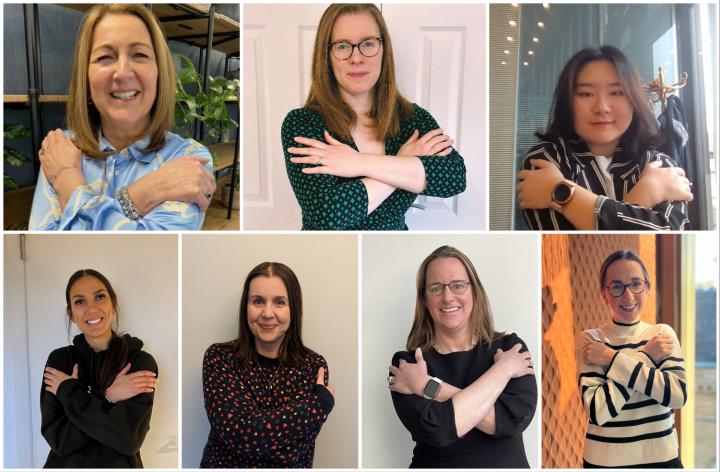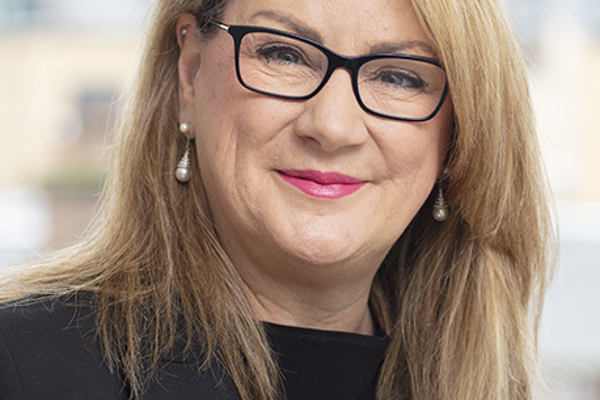
At Morton Fraser, we are committed to promoting gender diversity and inclusion not only within the Firm, but also driving change within the wider legal community.
This year's IWD theme "Embrace Equity" reminds us that as individuals we are all different and therefore to truly reach our goal, we must take equitable action. We spoke to women across the firm to find out what equity means to them.
Tulsi Mount Client Onboarding Advisor
Could you share some insights into your personal experiences as a woman in the legal profession?
Throughout my law degree and experience at Morton Fraser, there are more women than men.
However, there are fewer women with senior titles. I believe this might be because of the added pressure of child and care responsibilities.
As a future trainee solicitor, I aspire to these women. Morton Fraser's workplace also is very inclusive in this regard. Women speak openly about motherhood and our intranet has a section for 'Baby news!'. As such, they hopefully feel fully supported to achieve their goals.
Overall, I understand that as a woman, I may face challenges with career development and progression without a culture of equity.
How can law firms embrace equity and integrate this successfully into workplace culture?
Law firms must first assess how diverse and inclusive they really are with robust data. Morton Fraser is a good example this, holding itself accountable by publishing its diversity data, and implementing a 'diversity, inclusion and belonging strategy'.
As a result, Morton Fraser has established Employee Resource Groups which serve as a launching pad for advancing equity in the workplace. I am part of the Ethnic Minorities Group. The Resource Groups offer a "safe space" where members can share their experiences and inform the firm's policies and priorities.
However, allies are integral to the success of Employee Resource Groups, and as a result, to integrating equity successful into the workplace. Allies amplify the voices of underrepresented groups, and their numbers are critical in driving positive change. Employers also play a critical role in allyship by encouraging all employees to participate and providing resources for learning. For example, Morton Fraser is committed to holding its Partners accountable for progress in diversity, inclusion, and belonging.
In summary, law firms must first analyse its diversity data to gain greater insight. Only then can it consider ways in which it can foster a more equitable workplace.
What advice would you give women considering a career in the legal sector?
- Build a strong work ethic: hard work and dedication are required for a career in the legal sector.
- Network and seek out mentorship: take advantage of opportunities to socialise with those in the legal sector. Listen, and value every nugget of advice, wisdom or information.
- Find a work-life balance: there are often lots of legal socials – such as Edinburgh Foundation for Women in Law’s book club, or the Scottish Young Lawyers’ Association’s 5-a-side football and yoga. This is a good way to get to know more about those in the legal sector as well as have fun.
Yvonne Brady Head of Strategy, Restructuring & Insolvency
Could you share some insights into your personal experiences as a woman in the legal profession?
Having started my traineeship in the early 80s, there were very few women in the Corporate sector - and practically none in Insolvency, which is my area of expertise. The key lesson I learned was that having a mentor to help guide career progression and is someone you really trust to seek advice from is invaluable in building your career. Likewise, seeking to build a personal network where you can find support from those going through the same career experiences is invaluable. No-one can do it on their own - and asking for help is a sign of maturity, not weakness.
How can law firms embrace equity and integrate this successfully into workplace culture?
For law firms to embrace equity they must judge on what people do rather than what they say. There must be a focus on personal development - encouraging the best from every individual will maximise their potential and highlight talent. Firms must not unduly focus on the challenges in creating a truly representative workforce. We need to embrace the opportunities true diversity and inclusion brings to any organisation - from diversity of thought to culture to client service. Building on the positives that diversity brings makes us forward thinking and a profession fit for the future, welcoming to all.
What strategies do you suggest for increasing diversity and representation of women in leadership positions within law firms?
A relatively small number of women in leadership positions is still a concern and progress is slow. Firms need to invest in the personal development of talent within their workforce, encouraging that talent to use their voice and providing them with sponsors to really help their development and progression. As women we need to value what we bring to the table. We need to present solutions to challenges and while it is impossible to " have it all " - leadership teams need to actively engage with talented colleagues to encourage their ambitions and support them into management roles.
Jee-Young Song Trainee
Could you share some insights into your personal experiences as a woman in the legal profession?
As a woman and as a trainee, I certainly don’t feel out of place in terms of numbers alone – I believe women represent approximately 60% of all those entering the profession. It is clear that women don’t progress as fast; however, there are visibly fewer women in senior positions, so in that regard the gender bias can unfortunately be felt.
How can law firms embrace equity and integrate this successfully into workplace culture?
I believe that retention is the key issue to address; firms should monitor the support provided to women, in particular encouraging progression and skills development where the opportunity arises. Adopting a flexible working culture would also help, as this often supports the needs women may have (such as childcare, or health-related reasons).
What advice would you give women considering a career in the legal sector?
To be bold – especially when making clear what your career aspirations are, or what your needs and expectations are from your place of work!
Fiona Meek Senior Solicitor, Employment Team
Could you share some insights into your personal experiences as a woman in the legal profession?
I have been very fortunate that I have not had to overcome many barriers, and I think this is a hopeful picture that workplaces are changing.
At Morton Fraser, it is very encouraging to see a number of women in senior positions.
How can law firms embrace equity and integrate this successfully into workplace culture?
For me, the starting point is making sure we really understand what equity means, and distinguishing equity from equality.
It's about recognising that not everyone starts in the same circumstances, so providing everyone with exactly the same resources or opportunities will not work in achieving a truly fair workplace.
What advice would you give women considering a career in the legal sector?
Don't be put off if you don't fully meet the requirements for the role, apply anyway. Then show the employer the determination and ambition you have to succeed (and be better than the candidate who on paper ticks all the boxes!).
Do your research - beyond the legal stuff, what can the firm you're applying to offer you and why are they a better fit than the other competitors in the market? Look at what other initiatives they offer that shows their commitment to equality at work.
Jenny Dickson Chair
Could you share some insights into your personal experiences as a woman in the legal profession?
I am astounded by how much has changed in the profession since I joined it over 20 years ago. In a relatively short period of time, the experience of women has changed dramatically. At the beginning of my career it was very male dominated. With a few notable exceptions, senior positions in the legal community were all held by men. I have always worked at progressive firms with supportive colleagues, but the culture in the profession was macho. Office banter, client entertainment, promotion processes - these all created opportunities for men. As a woman, you had to have a thick skin and fight harder to progress.
How can law firms embrace equity and integrate this successfully into workplace culture?
Many law firms have embraced equity and many across the profession work hard to ensure diversity in our future profession. We hear about policies implemented. To deliver real change, in my view we need to do two things. First, be honest with one another about the challenges we face. Why do more women leave the profession? Together, can we change how we work? Secondly, we need to address our unconscious bias. As employers we often make policies that deliver practical changes - agile working hours, menopause support, etc. But, what about our bias? For example, do we spend the same amount of time speaking to a new father in our team about how they're going to juggle childcare as we would a new mother? This is just one example, which demonstrates how unconscious bias can have a real impact on all our staff.
What strategies do you suggest for increasing diversity and representation of women in leadership positions within law firms?
I strongly believe that if we address the difference, more women will naturally progress into leadership positions. Time and time again I see female staff underselling themselves, or not having the confidence to shout as loudly about their skills and experience as their male colleagues. This is a generalisation and does not apply to everyone, but it is noticeably visible. As leaders, it is incumbent upon us to ensure that individuals are assessed fairly - that we seek out and identify future leaders, and that we encourage those with potential to develop. Our differences add considerable value to profession. We shouldn't be striving to increase the number of women in leadership positions - we should be striving to ensure those positions are held by the candidates with the best credentials and ability to deliver.
Nicola Ross Partner, Commercial Litigation and Head of Debt and Asset Recovery
Could you share some insights into your personal experiences as a woman in the legal profession?
Although I like to think of myself as fairly "young", things now are much better than when I was at university (late 90s/early 2000s) when - on a work experience placement - I was told by the female partner that Mr X (the managing partner) preferred it if women wore skirts, so I should reconsider my trouser suit. Needless to say, things have moved on since then but there is still a way to go. Although the majority of lawyers are now women, there is still a lack of diversity in many law firms when you get to a more senior level. That does not reflect the make-up of the modern legal profession. The challenge is to address that, find out what the blockers are and do something about them.
How can law firms embrace equity and integrate this successfully into workplace culture?
Realising it's not a "one size" fits all model - what works for some people will simply not work for others. Ensuring that we are fully aligned with the concept of allowing people to be the best they can be and doing what we can to facilitate that. For example, I was pretty surprised to read this week that 80% of working mums leave the full-time workforce. I'm in the 20% because I work full time but broadly speaking, women often have the majority of the childcare burden on them and we need to recognise these external factors influence people's work life. Morton Fraser is a flexible place to work due to agile working and leadership teams that "get it" but that is certainly not the case across the legal profession.
What advice would you give women considering a career in the legal sector?
Go for it! A career in law is exiting, interesting and varied. Don't get me wrong, there are dull bits too however they're in the minority. There can be challenges, or difficult cases, but overcoming these always gives a real sense of personal satisfaction. Working somewhere like Morton Fraser gives me the opportunity to be the best I can be. The onus is on all employers to do that for their team-members so if you are interested in working in law, find somewhere that aligns with your values and your priorities.
Karen Wylie Senior Associate in Family Law
Could you share your some insights into your personal experiences as a woman in the legal profession?
On the whole, I have been very fortunate in my career to date. I decided to specialise in family law at the end of my traineeship. I have spent the majority of my career surrounded by supportive lawyers, men and women, many of whom I have admired.
Women leaders, and those who are also juggling the demands of motherhood, are very visible in Morton Fraser. The family law team is led by female partners. This has been very encouraging to me personally, particularly when I became a mum just over five years ago. I have never felt that I should hide the desire to have children or hide my family commitments to be considered serious about my career. Within my own team there is trust that the job will get done, even if I leave early due to a call from school or nursery. In the office, I also hear fathers talking about their own commitments explaining they are leaving to collect children from school or caring for other relatives etc. All this normalises that you can have family commitments but still get the job done and be respected.
I have had two periods of maternity leave. The reality is that being out of the workplace for a lengthy period does have an impact professionally. There’s always a tension between work and childcare commitments for all parents, and often much of the responsibility falls to mums. Hybrid working and some flexibility in the working pattern assists with the logistical challenges of caring for children or indeed any caring commitments such as elderly parents.
How can law firms embrace equity and integrate this successfully into workplace culture?
On a basic level, law firms generally need a supportive work culture in which discrimination and harassment are not tolerated and family friendly working is possible to help support women and retain female talent. Women who work part time need to be taken seriously and they should be given the same opportunities in relation to the quality of work they are given and the same promotion opportunities as those who work full time.
Law firms should also look at their gender pay gap findings, and consider the data and what can be done to close the gap.
It's also important that firms think about the challenges that women face in tackling inequality and think about creative ways to bring about equity. Law firms need to be keen to listen and to adapt to the needs of their employees. It is important to recognise that not all women start from the same place. There are many factors to take into account when considering embracing equity for women including the additional challenges faced by women who experience multiple and compounding inequalities such as those with disabilities or from ethnic minority or socio-economically disadvantaged backgrounds. In Morton Fraser I'm sure we still have work to do, however I am grateful for the hard work that has gone into engaging with and supporting groups of people who are likely to suffer discrimination. The firm has a number of Employee Resource Groups (ERG) including a Women's ERG which feed views back to the firm.
What advice would you give women considering a career in the legal sector?
I think the first piece of advice I'd give is to have confidence in your abilities, and if you lack confidence to have a go anyway. It is tempting to refuse to take a risk or accept a new opportunity because you don’t feel ready. If you genuinely need to develop your skills, find someone to mentor you and help you develop your expertise and experience.
It can be difficult to find balance. That is especially true if you have children or other caring responsibilities. Working in law you need to be able to draw boundaries. We all need a healthy life outside of work.
Find out more about International Women's Day at their website and read more about what we are doing to champion gender diversity and inclusivity on our Diversity, Inclusion and Belonging page.


